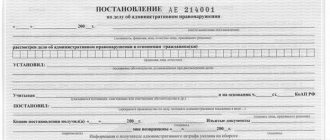How does a trial for an administrative offense proceed?
Administrative cases are considered in court according to the norms of the Code of Administrative Offenses of the Russian Federation dated December 30, 2001 No. 195-FZ. The judge and the offender are present at the hearing. The participation of the court secretary and the keeping of minutes of the meeting is provided for by law. If the case is considered by another authorized body rather than a court, the process is similar. An official is reviewing the situation.
Before the hearing begins, the offender is required to sign a document explaining his rights. Usually this is a receipt.
The meeting begins with the judge introducing the parties and a brief summary of the essence of the process:
- the judge represents the offender;
- explains to him his rights and obligations;
- accepts petitions, if any;
- accepts challenges.
After the introductory part, the federal judge listens to the violator’s point of view, clarifies the information if necessary, and leaves to make a decision. Based on the information received, a judicial act is issued.
To come or not to come?
The obligations of those passing through the court as witnesses are described in the Criminal Code in Article 56, namely, in the first paragraph of the sixth part and in the seventh part. From this we can learn that good reasons are those that are sufficient to justify themselves and have grounds. In addition, the reason in the law is formulated as a certain condition that can explain a person’s actions. As for failure to appear, here the reason is the basis that allows for inaction, that is, non-attendance.
It follows from the law that a person is simply obliged to come to court. But you can skip the meeting if a person has to care for a sick person or is so sick that he is physically unable to attend the trial. If the summons was not received or did not arrive on time, the witness also finds himself in a situation where he simply cannot attend the meeting, and his guilt is removed. Some other circumstances not directly stated in the law may serve as justifications if they are truly serious. A witness who does not come to the trial can try to explain everything formally, with papers, by writing an appeal in the appropriate form. And yet, if possible, you should come to the meeting, thereby fulfilling your duty as a citizen of the country.
Are minutes of the court hearing kept?
Usually not. According to Art. 29.8 of the Code of Administrative Offenses of the Russian Federation, the minutes of the meeting are needed if the case is being considered by a collegial body. When the trial is reviewed by a judge alone, it is not necessary.
The law does not indicate that maintaining a document is prohibited. If there is such a need, the judge may ask the secretary to keep minutes when familiarizing himself with the administrative case.
The offender may request that a record of the court hearing be kept. The judge will grant or deny such a request. If the decision is positive, a protocol on the AP is kept by the secretary.
Failure to appear in court for an administrative violation
To make a fair decision, the offender must speak out in his own defense at the trial. To do this, the judge grants the violator the right and imposes the obligation to attend the meeting. For this purpose, the participant is notified in a timely manner according to the rules from Art. 25.15 Code of Administrative Offenses of the Russian Federation.
Once a citizen has received notification in the manner prescribed by law, his responsibility is to appear in court by a strictly specified time. Failure to appear is perceived as a violation of duty and may result in sanctions. This includes a possible fine of 1,000 rubles, but this is decided at the discretion of the judge.
For example, if a person is charged with driving a car while intoxicated and he does not appear at the trial, then the case will simply be considered without his participation. And if a citizen is caught for non-payment of alimony, then in this case they can issue a forced arrest or impose a fine.
If the violator is absent for a valid reason, no fine is imposed, but the meeting is postponed. Valid reasons include:
- Failure to receive notification on time. If the summons was sent on the day of the trial, this is enough to postpone the hearing.
- Illness of a citizen or one of his close relatives, which is confirmed by a certificate from the hospital.
- Emergency: cataclysm, natural disaster, etc.
- Absence of a citizen from a city or country, confirmed by documents. A tourist holiday on a package tour is not considered a reason for missing a meeting.
- Long business trip.
- Problems with transport links.
A common reason for the absence of a defendant is financial problems. If there is no money for travel, the meeting may be postponed.
If the participant is notified on time, but does not appear in court without reason, the judge may enter a judgment in absentia based on the testimony and evidence available in the case. The decision is made without the defendant, if there are no reasons for failure to appear or they are disrespectful, the offender deliberately delays the completion of the proceedings.
Postponement of the trial in the AP case
If a citizen cannot be present in court for a valid reason, he is obliged to report this. The judge recognizes the reason for failure to appear as valid and makes a decision to adjourn the hearing.
Adjournment of a trial in an administrative case is possible:
- If the offender fails to appear in court for a valid reason.
- If the offender requested to postpone the case and provided a valid reason for his inability to appear at the hearing.
- If the violator's lawyer petitioned to postpone the case for good reason.
Participants who receive notice must petition the court to adjourn the case prior to the hearing. If the judge is not properly notified within the specified period, any reason is considered contempt and may become the basis for the court to conclude that procedural rights have been violated.
When a case is transferred to another court
The rules are regulated by Art. 27 Federal Law No. 21. The court will transfer the case of an administrative offense to another court if:
- the offender or his representative requests that the case be transferred to the court at the place of registration or residence address;
- if violations of the rules of jurisdiction upon acceptance of the case are revealed;
- if one or more judges have granted a challenge or further consideration of the case in this court is impossible. In such a situation, the administrative case is transferred to a higher court.
Evgeniy Baidalin
Practicing lawyer in civil and arbitration cases. More than 8 years of experience
Ask a Question
A court of general jurisdiction will transfer the case to an arbitration court if, during the consideration of evidence, it turns out that the case falls within the jurisdiction of the arbitration court by law.
To transfer the case to another court, the judge issues a ruling. It can be appealed. The transfer is made at the end of the period for appealing the determination. If a participant in the process files a private complaint, the decision is made after the court’s decision on this appeal.
How long does a court hearing in an administrative case last?
The time it takes to consider a case depends on several factors:
- Composition of the offence.
- Defendant's admission of guilt.
- Explanations to the offender regarding the issues of bringing him to justice.
- Availability and volume of evidence.
- The presence and number of applications and other factors.
The period of consideration depends not only on the actions of the offender, but also on the judge. He may be in the meeting room for 10 minutes or several hours.
When a magistrate considers similar administrative cases, a judicial act is issued according to one principle within five minutes. Only the name of the defendant changes in the act. If the case involves a new violation that is not previously known to the judge, he will need more time to sort through the evidence and print the document.
Circumstances and failure to appear
What is a valid reason for a witness not to appear in court? Current legislation, unfortunately, does not contain an exhaustive list of such circumstances that can be assessed as valid. This becomes an obstacle to correct paperwork. As experienced lawyers object, it is impossible to take into account all possible disrespectful and valid reasons and document them at the state level. Others say this is not required.
The Criminal Code contains a definition of a valid reason, suggesting that any reason that is justified and does not violate laws and rights, does not depend on the will of the citizen himself and turns appearance into a process difficult or unrealistic is considered as such.
How to behave in court in cases of administrative offenses
If you have received a summons for an administrative violation, follow the step-by-step instructions:
Step 1. Read the case materials. A similar right is reserved for participants in the process in the Code of Administrative Offenses of the Russian Federation and the Civil Procedure Code of the Russian Federation.
The offender files an application to study the case materials. The form can be obtained from the court or requested here. The completed document is submitted to the court office or signed by the court clerk. Cases are issued by an office worker.
The court does not provide a copy of the file to the applicant. To preserve the case materials, take photographs of all pages of the document. Such a right is enshrined in law.
Carefully read the case materials, the testimony of the victim and witnesses.
Step 2. Start preparing for the meeting.
Decide whether you need a lawyer and make a written list of questions you plan to ask in court to protect your interests of the victim or witnesses.
Evgeniy Baidalin
Practicing lawyer in civil and arbitration cases. More than 8 years of experience
Ask a Question
To call witnesses to the hearing, you must submit a petition to the court.
If there is evidence that is not in the case file, prepare a petition for discovery.
Evidence includes:
- video camera recordings;
- eyewitness accounts, etc.
Step 3: Arrive at court early.
Before the meeting begins, turn off your phone. Provide the secretary with your passport and power of attorney when representing the interests of the defendant.
Behave correctly at the meeting:
- Address the court as “dear court” or “your honor.” All other requests will be perceived as disrespect.
- Arguing in court is unacceptable. You may be fined for this.
- Do not interfere with the actions of any of the participants in the meeting, including the judge.
- Don't interfere with the progress of things.
- Comply with all requests of the judge.
The procedure for consideration involves listening to the arguments and evidence of the parties, assessing them by the court and making a decision.
If you cannot obtain the necessary evidence, you can petition the court to obtain it. The court can either refuse or grant the request. To avoid losing your case, seek help from a lawyer.
How to convince a judge to reduce your sentence
Every citizen of the Russian Federation has the right to petition for a mitigation of punishment. The list of mitigating circumstances is indicated in Part 1 of Art. 4.2 Code of Administrative Offenses of the Russian Federation. In addition, judges have the discretion to recognize a mitigating circumstance. Any fact is taken into account.
For example, a violation of the law by a single mother is a sufficient fact to mitigate the punishment.
A petition for mitigation of punishment is considered without fail, followed by a ruling.
Documents are the key to wallet security
So, as stated above, an unexcusable reason for failure to appear may serve as a reason to issue a fine. Usually it varies from one thousand to two and a half; the judge chooses specific figures based on the circumstances of the case. It is not uncommon for unfortunate witnesses to try to justify themselves by saying that they simply did not see the notice in the mailbox, and therefore were unable to receive the summons on time and find out about the place and time of the meeting. For the court, such justification means absolutely nothing, so you should not hope for leniency. The only thing that can save you in such a situation is the presence of a document officially confirming that the reason for non-appearance was sufficiently valid.
On the other hand, the judge usually issues a fine when the situation is regarded as an insult to the state and the highest authority. Repeated failure to appear is almost always a good enough reason to impose a fine.
Which court considers administrative offenses
Cases of administrative offenses are heard by magistrates' courts . The exceptions are administrative cases of the following nature:
- Courts of general jurisdiction hear cases if one of the parties is an individual.
- The district court considers the case if it is subject to an administrative investigation or if the punishment includes suspension of activities, dismissal or deportation abroad.
- The district court also deals with cases of violation of laws on meetings and rallies, cultural and historical values, and disobedience to civil service employees.
Some nuances
If it is necessary to bring a child under 16 years of age to court as a witness, then a notice is sent to the parents, since they will have to accompany the child to the law enforcement agency. If there are no parents, then these will be other representatives of the minor who have the right to do so under the law.
In some cases, the court entrusts one person with a subpoena and then gives it to another. In this case, the document is given directly to your hand. After some time, such a person will have to present to the judge the counterfoil of the notice or a copy on which the addressee noted that the summons was received. If a person refuses to accept the notice, it is generally accepted that the data was transferred to him on time anyway.
A little about the law
Article 51 of the Russian Constitution, as follows from the text and comments, frees a person from the need to blame (as well as defend) himself, his family, and in some cases other persons. However, it does not exempt from mandatory participation in court hearings. The degree of necessity is determined by the judge in accordance with the following considerations:
- participant status: presence is almost mandatory for the plaintiff and defendant; much more lenient requirements apply for witnesses;
- status of the process: administrative and arbitration cases, compared to criminal cases, are conducted under less stringent conditions;
- special circumstances: if it is impossible to determine the degree of guilt without the citizen's testimony, he will be brought to the hearing, despite all objections.
Don't take it for granted that you can simply ignore the summons and stay home. If certain circumstances occur, liability for such irresponsible behavior is provided for by both the Civil, Criminal, and Arbitration Procedural Codes - only the severity of the punishment can change.








